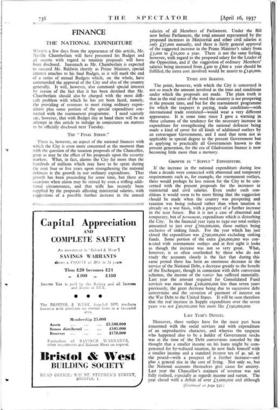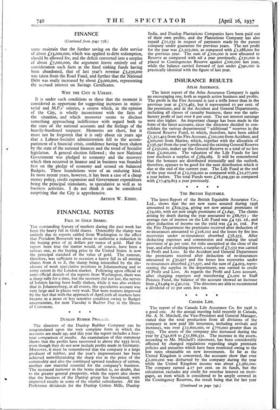THE NATIONAL EXPENDITURE -
FINANCE
WITHIN a few days from the appearance of this article, Mr. Neville Chamberlain will have presented his Budget and all secrets with regard to taxation proposals will have been disclosed. Inasmuch as Mr. Chamberlain is expected to succeed Mr. Baldwin shortly as Prime Minister, special interest attaches to his final Budget, as it will mark the end of a series of annual Budgets which, on the whole, have commanded the approval of the City and also of the country generally. It will, however, also command special interest by reason of the fact that it has been destined that Mr. Chamberlain should also be charged with the most diffi- cult problem with which he has yet been faced, namely, the providing of revenues to meet rising ordinary expen- diture plus some portion of the special expenditure con- nected with the rearmament programme. I need scarcely say, however, that with Budget day at hand there will be no attempt in this article to indulge in conjectures on matters to be officially disclosed next Tuesday.
THE " FINAL STRAW."
There is, however, an aspect of the national finances with which the Ciry is even more concerned at the moment than with the question of the taxation proposals of the Chancellor, great as may be the effect of his proposals upon the security markets. What, in fact, alarms the City far more than the hundreds of millions which may have to be spent during the next four or five years upon strengthening the national defences is the growth in our ordinary expenditure. That growth has been proceeding for some time, but there are occasions when alarm may be stirred by even a trifling addi- tional circumstance, and that trifle has recently been supplied by the proposals affecting ministerial salaries, with suggestions of a possible further increase in the annual salaries of all Members of Parliament. Under the Bill now before Parliament, ,the total amount represented by the proposed increases in Ministerial and other civil salaries is only L37,000 annually, and there is fairly general approval of the suggested increase in the Prime Minister's salary from £5,000 to LI o,000 a year. There is not the same feeling, however, with regard to the proposed salary for the Leader of the Opposition, and if the suggestion of ordinary Members' salaries being increased from i400 to £600 a year should be fulfilled, the extra cost involved would be nearer to £140,000.
TIMES AND SEASONS.
The point, however, with which the City is concerned is not so much the amount involved as the time and conditions under which the proposals are made. The plain truth is that in the real sense of the word the country is not prospering at the present time, and but for the rearmament programme for which the taxpayer is paying, trade conditions—with international trade restricted—would wear a very different appearance. It is some time since I gave a warning in these columns of the tendency for the necessary increase in expenditure for strengthening the national defences being made a kind of cover for all kinds of additional outlays by an extravagant Government, and I used that term not as applicable in special degree to the present Government but as applying to practically all Governments known to the present generation, for the era of Gladstonian finance is now becoming little more than a memory.
GROWTH IN " SUPPLY " EXPENDITURE.
If the increase in the national expenditure during less than a decade were connected with abnormal and temporary requirements such as, for example, the rearmament outlays, there would perhaps be less reason for the City to be con- cerned with the present proposals for the increases in ministerial and civil salaries. Even under such con- ditions it would seem to be more fitting that the suggestion should be made when the country was prospering and taxation was being reduced rather than when taxation is already on a war basis, with a prospect of a further increase in the near future. But it is not a case of abnormal and temporary, but of permanent, expenditure which is disturbing the City. In the financial year 1929 to 193o our total outlays amounted to just over L7oo,00o,000, those outlays being exclusive of sinking funds. For the year which has just closed the expenditure was L79o,000,000 excluding sinking funds. Some portion of the extra k90p00,000 was con- meted with rearmament outlays and at first sight it -looks as though the increase was not so very great. What, however, is so often overlooked by those who do not study the accounts closely is the fact that during this same period there has been an enormous decrease in the service of the National Debt, a decrease greatly to the benefit of the Exchequer, though in connexion with debt conversion schemes, the income of the rentier has suffered materially. Last year the amount required for Consolidated Fund services was more than £roo,000,000 less than seven years previously, the great decrease being due to successive debt conversions and the cessation of payment of interest on the War Debt to the United States. It will be seen therefore that the real increase in Supply expenditure over the seven years was not k9o,000,000. but more like f,19o,000,000.
LAST YEAR'S DEFICIT.
Moreover, these outlays have for the most part been concerned with the social services and with expenditure of an unproductive character, and whereas the taxpayer who happened also to be a holder of Government stocks was at the time of the Debt conversions consoled by the thought that a smaller income on his loans might be com- pensated for by-reduced taxation, he now finds himself with a smaller income and a standard income tax of 4s. 9d. in the pound-rwith a prospect of a . further increase—and plus a general rise in the cost of living. Not only so, but the National accounts themselves give cause for anxiety. Last year the Chancellor's estimate of revenue was not fully realised, especially as regards income and surtax. The year closed with a deficit of over £5,000,00o and although (Continued on page 74o.) FINANCE
(Continued from Page 738.)
some maintain that the further saving on the debt service of about £13,000,000, which was applied to debt redemption, should be allowed for, and the deficit converted into a surplus of about E7,000,000, the argument leaves entirely out of consideration such facts as the fixed sinking funds having been abandoned, that of last year's revenue £5,250,000 was taken from the Road Fund, and further that the National Debt was really increased by about ,C9,000,000, representing the accrued interest on Savings Certificates.
WHY THE CITY IS UNEASY.
It is under such conditions as these that the moment is considered as opportune for suggesting increases in minis- terial and M.P.s' salaries, a course which, in the opinion of the City, is wholly inconsistent with the facts of the situation, and which moreover seems to disclose something approaching indifference with regard both to the state of the national accounts and the feelings of the heavily-burdened taxpayer. Memories are short, but it must not be forgotten that it is only about six years ago that a Labour-Socialist administration fell to the accom- paniment of a financial crisis, confidence having been shaken by the state of the national finances and the trend of Socialist legislation. A general election followed ; the new National Government was pledged to economy and the recovery which then occurred in finance and in business was founded first on the pledge of economy and second on balanced Budgets. These foundations were of an enduring kind. In more recent years, however, it has been a case of a cheap money policy, credit expansion and Government expenditure being the principal stimulants, to speculative as well as to business activities. I do not think it can be considered surprising that the City is apprehensive.
ARTHUR W. KIDDY.























































 Previous page
Previous page